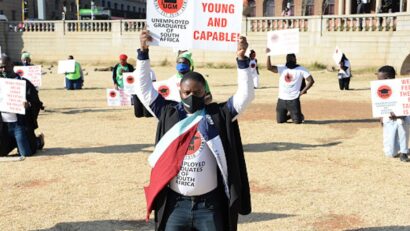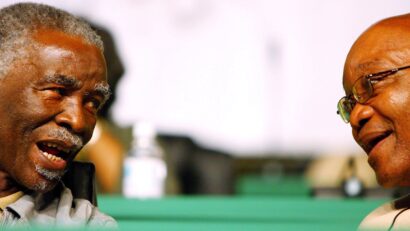
Persisting inequality has made many young South Africans question the choices made by Nelson Mandela – podcast
Some young South Africans have begun to question Nelson Mandela’s legacy, and the choices made in the transition to democracy after the end of apartheid in 1994. Some have even called him a “sellout”.
To mark 30 years since South Africa’s post-apartheid transition began, The Conversation Weekly podcast is running a special three-part podcast series, What happened to Nelson Mandela’s South Africa?
In this final episode of the series, we talk to two academics about the way Mandela is viewed by young South Africans today, and the challenges facing the African National Congress (ANC), which has governed the country for three decades, and its current president, Cyril Ramaphosa.
Young people make up 34% of South Africa’s population. Many of them were born after 1994.
Known as the “born free” generation, they never lived through the persecution of apartheid. And they’re not afraid to question the state of the country they’ve inherited.
“There’s this grappling of the new generation trying to understand why South Africa still looks the way that it does,” explains Sithembile Mbete, a lecturer in political science at the University of Pretoria.
I think that there’s a revision or a review of Nelson Mandela’s legacy, mainly just from a dissatisfaction with the present and seeing the persistence of inequality of all sorts of manifestations – of white supremacy and racism and then all of the big political issues that we have for young people… and you’ve seen then a backlash to that amongst young people who are, like, why can’t we criticise him? Why can’t we criticise the decisions that were made?
Principal among the issues facing young people, she says, is unemployment. At the end of 2023, the unemployment rate for young South Africans between the ages of 15 and 34 was 44%. Mbete says that young people are asking serious questions about the way the economy is structured, but they’re not yet playing enough of a role in shaping the country. She adds:
Our expectations of what could have been done in the past are too high, but then our expectations of what we should be re-imagining in the present for the future are too low.
Elections looming
South Africans head to the polls on 29 May in a closely fought election in which polls suggest the ANC may, for the first time since 1994, lose the electoral majority needed to form a government.
Says Richard Calland, an associate professor in public law at the University of Cape Town, who recently co-wrote a book assessing South Africa’s post-apartheid heads of state:
We’re coming to the end of that period of domination by the ANC now; we’re into the period of what I call the second transition.
Despite the electoral dominance of the ANC over the last 30 years, says Calland, the party has had leaders of very different character, from Mandela to Thabo Mbeki, Kgalema Motlanthe, Jacob Zuma and now Cyril Ramaphosa.
Ramaphosa has had the very difficult task of rebuilding the state, rebuilding confidence in public ethics. And it’s really a tough battle. It’s like Sisyphus pushing and pushing that big stone up the hill. And it’s going to take quite a long time, I think, to recover lost ground.
Listen to our interviews with Richard Calland and Sithembile Mbete on The Conversation Weekly in the third and final episode of our What happened to Nelson Mandela’s South Africa? series. And read more coverage of the 30th anniversary of South Africa’s democratic transition from The Conversation Africa.
A transcript of this episode will be available shortly.
Disclosure statement
Sithembile Mbete has received grant funding for research on South African foreign policy from the National Research Foundation, National Institute of Social Science and Social Science Research Council. She’s received research support on South African democracy from the Open Society Foundation and the Ford Foundation. Richard Calland is a partner at The Paternoster Group: African Political Insight. He is also a member of the Advisory Council of the Council for the Advancement of the South African Constitution.
Credits
Newsclips in this episode from ITV News, CNBC Africa and SABC News.
Special thanks for this series to Gary Oberholzer, Jabulani Sikhakhane, Caroline Southey and Moina Spooner at The Conversation Africa. This episode of The Conversation Weekly was written and produced by Mend Mariwany, with production assistance from Katie Flood. Gemma Ware is the executive producer. Sound design was by Eloise Stevens, and our theme music is by Neeta Sarl. Stephen Khan is our global executive editor, Alice Mason runs our social media and Soraya Nandy does our transcripts.
You can find us on Instagram at theconversationdotcom or contact the podcast team directly via email. You can also subscribe to The Conversation’s free daily email here.
Listen to The Conversation Weekly via any of the apps listed above, download it directly via our RSS feed or find out how else to listen here. Läs mer…


